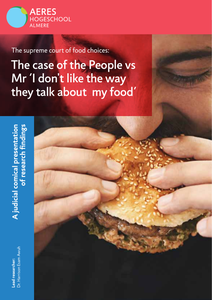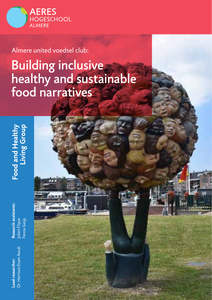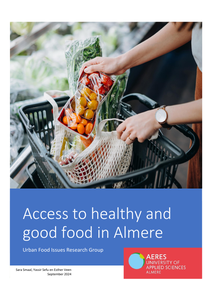This booklet outlines a 'court case' about shaming someone's food choices. Dit boekwerk behandelt een 'rechtszaak' over het te schande maken van iemands voedselkeuzes.
DOCUMENT

Eating rate is a basic determinant of appetite regulation, as people who eat more slowly feel sated earlier and eat less. Without assistance, eating rate is difficult to modify due to its automatic nature. In the current study, participants used an augmented fork that aimed to decelerate their rate of eating. A total of 114 participants were randomly assigned to the Feedback Condition (FC), in which they received vibrotactile feedback from their fork when eating too fast (i.e., taking more than one bite per 10 s), or a Non-Feedback Condition (NFC). Participants in the FC took fewer bites per minute than did those in the NFC. Participants in the FC also had a higher success ratio, indicating that they had significantly more bites outside the designated time interval of 10 s than did participants in the NFC. A slower eating rate, however, did not lead to a significant reduction in the amount of food consumed or level of satiation.These findings indicate that real-time vibrotactile feedback delivered through an augmented fork is capable of reducing eating rate, but there is no evidence from this study that this reduction in eating rate is translated into an increase in satiation or reduction in food consumption. Overall, this study shows that real-time vibrotactile feedback may be a viable tool in interventions that aim to reduce eating rate. The long-term effectiveness of this form of feedback on satiation and food consumption, however, awaits further investigation.
DOCUMENT

This study theorizes on the sociomateriality of food in authority-building processes of partial organizations by exploring alternative food networks (AFNs). Through the construction of arenas for food provisioning, AFNs represent grassroots collectives that deliberately differentiate their practices from mainstream forms of food provisioning. Based on a sequential mixed-methods analysis of 24 AFNs, where an inductive chronological analysis is followed by a qualitative comparative analysis (QCA), we found that the entanglements between participants’ food provisioning practices and food itself shape how authority emerges in AFNs. Food generates biological, physiological and social struggles for AFN participants who, in turn, respond by embracing or avoiding them. As an outcome, most AFNs tend to bureaucratize over time according to four identified patterns while a few idiosyncratically build a more shared basis of authority. We conclude that the sociomateriality of food plays an important yet indirect role in understanding why and how food provisioning arenas re-organize and forge their forms of authority over time. Pascucci, S., Dentoni, D., Clements, J., Poldner, K., & Gartner, W. B. (2021). Forging Forms of Authority through the Sociomateriality of Food in Partial Organizations. Organization Studies, 42(2), 301-326. https://doi.org/10.1177/0170840620980232
DOCUMENT

The aim was to study the needs, opportunities and effects of citizen engagement in the urban food system transition. This addresses the issue of - ‘how’, ‘in what ways’ and ‘through what methods’ - citizens can be engaged in the developments towards a more sustainable and healthy regional food system. The research project sought to investigate the roles citizen engagement can take in the transformation of the urban food environment towards healthier and sustainable food consumption patterns. The study covers desired food futures; food discourse; the message our bodies convey about our eating habits; the effect of Covid-19 on food pattern transformations; the term 'organic' in relation to food; mass media as a source of information about food.
DOCUMENT

Trends in eiwittransitie kunnen regionaal verschillen. In groeiende economieën verschuiven diëten wereldwijd van plantaardige naar dierlijke eiwitten. In veel economisch ontwikkelde regio's gebeurt echter het tegenovergestelde vanwege de zorg voor milieu en gezondheid. Wij onderzochten de relatie tussen vijf drijvende krachten en eiwittransitietrends zoals deze worden ervaren door jongvolwassenen in ontwikkelde regio's in China (Shanghai) en Nederland (Amsterdam, lees: de Randstad). De onderzochte drijvende krachten waren: milieubewustzijn; het beleid; cultuur; geld; en gezondheid. De gegevens zijn verkregen door 200 vragenlijsten te laten beantwoorden in beide regio's. De resultaten geven aan dat jongvolwassenen in Shanghai meer dierlijke eiwitten consumeren dan plantaardige eiwitten, maar dat er een verandering naar plantaardige eiwitten is ingezet, terwijl de trend van jongvolwassenen in Amsterdam om plantaardig eiwit te consumeren al verder ontwikkeld is. De rangschikking van de drijvende krachten in Shanghai was Geld> Milieubewustzijn> Gezondheid> Cultuur> Beleid, en in Amsterdam Gezondheid> Milieubewustzijn> Geld> Beleid> Cultuur. Eiwitkeuzes in de voeding van jongvolwassenen worden dus in Shanghai door andere drijvende krachten bepaald dan in Amsterdam
MULTIFILE

Due to the environmental and nutritional benefits of insects, their consumption would be one of the solutions to feed the growing human population. Despite the increasing interest in the use of insects as food and feed, consumer acceptance is the major obstacle to successful implementation in Western countries and we studied the factors that influence consumer acceptance in a group of university students from Germany and the Netherlands. In this exploratory research, a survey was conducted (n = 222). Socio‐demographic and psychological factors were established from a theoretical review. In addition, we elaborated on questions regarding information on the health and environmental benefits of consuming insects. Initially, the data obtained are presented through descriptive statistics. The influence of the socio‐demographic and psychological factors, and the information on the willingness to accept insects as animal feed and human food was analyzed using correlations and multiple linear regressions. Results showed more willingness to accept insects as animal feed than in human food. The acceptance among German and Dutch students seems to be driven by issues similar to those in other European countries, such as visual aspects and knowledge about the benefits. The effect of the information on willingness constitutes an important finding of this study, especially for the use of insects in animal feed, since most of the previous studies have focused on the use of insects as human food. Our data support the need to inform and educate consumers about the environmental and health benefits of entomophagy. We conclude that effective efforts to implement entomophagy could increase the level of familiarity with the insect food and inform (or educate) consumers about its benefits. Insights from this study are useful to address studies focusing on specific segments of possible early adopters and consequently addressing communication strategies in this market segmentation.
DOCUMENT

This report delves into food insecurity in Almere, focusing on how residents with limited financial means access and consume (healthy) food. The study employed an action research approach, engaging directly with affected individuals and stakeholders to understand their challenges and co-develop solutions. The primary aim was to empower participants by amplifying their voices and providing actionable insights into addressing food insecurity in the community. To achieve this aim we conducted workshops, in-depth interviews and a study using WhatsApp.
DOCUMENT

Docentonderzoeker Rob van Diepenbeek was een van de sprekers op de Intelligent Food processing & packaging Virtual Summit, een online platform waar foodprofessionals kunnen netwerken, ideeën en kennis uitwisselen en van elkaar leren waar het gaat om toekomst van ons voedsel. Rob ging onder meer in op de nauwe samenwerking van HAS Hogeschool met Food Tech Brainport in Helmond, een belangrijke experimenteerruimte als het gaat om het terugdringen van voedselverspilling en bij- en reststromen te verwaarden door middel van milde conservering en milde scheidingstechnieken. Veelbelovende productapplicatie-kansen en energiebesparingen kwamen aan bod.
DOCUMENT

Due to a growing challenge to feed the world’s population and an increased awareness to minimize the impact of our food choices on climate change, a more plant-based diet has gained popularity with a growing number of plant-based products on the market. To stimulate a plant-based diet that also improves long-term health, data are needed to monitor whether these products are healthy alternatives to animal-based foods. Therefore, this study inventoried 916 plant-based meat, fish, and dairy alternatives from eight Dutch supermarkets. The nutritional quality of each product was assessed by (1) the Dutch food-based dietary guidelines and (2) the Nutri-Score. The results show that over 70% of meat, fish, and dairy alternatives have an A/B Nutri-Score (indicating high nutritional quality), but do not comply with the Dutch dietary guidelines. This is mainly due to high salt and low vitamin B12 and iron content (meat and fish alternatives) or low protein and calcium levels (dairy alternatives). In conclusion, the majority of plant-based products are nutritionally not full alternatives of the animal-based equivalents; however, there are still opportunities for reformulation. To aid the consumer in making healthy plant-based food choices, a better alignment between the Nutri-Score and the recommended dietary guidelines is needed.
DOCUMENT

Most beginning food forests face the following challenge: how do we get the harvest to the consumer? At food forest 't Mortelke they had the same question. The following research presents the answer to the following question: 'What are potential outlets for the harvest of Voedselbos 't Mortelke and how can these collaborations be realized?' The research provides more clarity on the needs of the market regarding potential collaborations with Voedselbos 't Mortelke. Interviews with interested parties (restaurants, country stores, organic supermarkets, individuals) revealed that the most appropriate form of cooperation with the food forest lies with fine-dining restaurants in the Eindhoven area. To initiate these collaborations an experimental phase is needed in which the chefs can get to know the products of the food forest. As a result of this research, several collaborations with restaurants have been initiated! Due to privacy reasons, certain parts of the research have been removed from the publication version.
DOCUMENT
